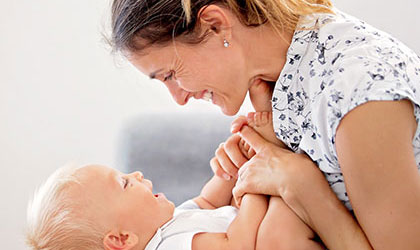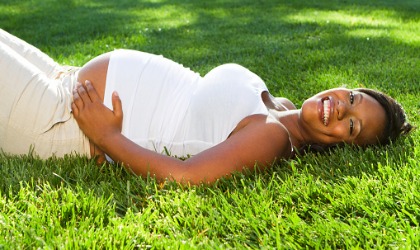
Bone health is probably the last thing on your mind when you’re in the throes of pregnancy. Chances are, you’re more preoccupied with morning sickness or satisfying those weird and wonderful cravings. However, the importance of looking after your bones at this time can’t be overstated. Adopting bone-healthy habits will support you and your growing baby throughout pregnancy.
What happens to bones during pregnancy?
Pregnancy is an interesting time for bone health. On the one hand, it can be a bone-protective since your body produces more oestrogen, which is widely known to be a bone-supporting hormone.
That said, your baby relies on your nutritional stores for its skeletal development, so pregnancy can also place extra demands on your bones. If your baby doesn’t get what it needs, it will leach it from your bones, putting you at risk for osteoporosis, a condition in which bones become brittle.
All this is to say that looking after your bone health during pregnancy is critical. And simple tweaks to your diet and lifestyle are all you need.
How to support bone health during pregnancy
Get enough calcium
During pregnancy, you need additional calcium to help build your baby’s skeleton and teeth (1). Without a reliable supply, your baby will drain your mineral reserves and potentially weaken your bones.
Aside from traditional calcium sources – milk, cheese, and yoghurt – you can find this mineral in green leafy vegetables (rocket, curly kale, and watercress), tofu, fortified soya drinks, and some fish, including sardines and pilchards.
It’s important to note that you should take care with certain cheeses on your quest to increase calcium. Avoid soft cheeses with white rinds like brie, camembert, and chèvre and blue cheeses, including gorgonzola and Roquefort. These varieties are only safe to eat if cooked.
You need around 1,000mg of calcium in pregnancy. So, alongside increasing dietary calcium, it might be worth including supplemental calcium to cover any shortfalls.
Don't forget vitamin D3
Calcium isn’t the only nutrient involved in bone health during pregnancy. You also need adequate amounts of vitamin D3 to support the absorption and utilisation of calcium (2). Together, calcium and vitamin D3 help build and maintain bones.
Although can find small amounts in oily fish, eggs and red meat, the best source of vitamin D3 is sunlight: when the sun directly hits the skin, the body can synthesise vitamin D3. In summer months, most fair-skinned people can make enough vitamin D3 within a few minutes, while people with darker skin need more time.
If you don't have proper sun exposure – which can be challenging if you live in the UK, particularly between October and March – spend most of your time indoors or cover your skin with clothing, you’ll struggle to obtain enough vitamin D3 from food alone. This can be even harder if you’re vegetarian or vegan, as most sources derive from animal products.
As such, the NHS recommends pregnant women take a daily supplement containing 10µg as a maintenance dose (3). Vegan mums-to-be can look for a suitable vitamin D3 formula derived from plant-based cholecalciferol.
Eat a balanced diet
Besides dietary calcium and vitamin D3, you also need to ensure a reliable intake of other bone-supporting nutrients, including vitamin K2, zinc, magnesium, vitamin C, and omega-3 fatty acids, all of which play critical roles in bone formation and maintenance.
Eating a balanced, whole-food, Mediterranean-style diet – packed with fruit, vegetables, whole grains, legumes, nuts, seeds, oily fish, extra virgin olive oil, and a small amount of red meat – is one of the best ways to meet your nutritional needs during pregnancy.
If, however, you’re worried about your intake, we recommend a high-strength, comprehensive pregnancy multivitamin containing plenty of bone-bolstering nutrients, like calcium and vitamin D3 – to plug any gaps. You may also wish to take a fish oil formula or vegan equivalent derived from microalgae alongside this.
Exercise safely
Beyond improving pregnancy symptoms – backache, bloating, swelling, constipation, low mood, sleep problems, and sluggishness – exercising is a useful tool for bone health throughout pregnancy.
The pushing and tugging that occurs during physical activity makes bones stronger and denser (4). Weight-bearing exercise (jogging, dancing, brisk walking), flexibility practices (yoga, Pilates, tai chi), and resistance training (weight-lifting) are great options to support bones during pregnancy.
Try to maintain your typical exercise routine for as long as you feel able to. Just be sure not to exhaust yourself. As a rule of thumb, you should be able to maintain a conversation when you exercise. If you become noticeably breathless when you talk, this may indicate you’re working out too vigorously. Be mindful that you may need to slow down your exercise routine as your pregnancy progresses, too.
Exercise tips for pregnancy
-
Always warm up before exercise and cool down afterwards.
-
If you go to a fitness class, inform the teacher that you’re pregnant.?
-
Try to keep active daily – even a quick walk can help.
-
Steer clear of any activity that involves the risk of falling, including skiing, ice hockey, gymnastics, and cycling.
-
Avoid intense exercise in hot weather.
-
Drink plenty of water when you work out.
Stop smoking
You’re probably familiar with calls to avoid smoking during pregnancy. Aside from increasing the risk of stillbirth, birth defects, and sudden infant death syndrome, it can also lead to weak, brittle, and porous bones (5).
We understand that quitting isn’t always easy, so get all the help you need. The NHS is a great place for support and advice.
You can learn more about the effects of smoking on bone health here.
Find out more
If you found this article on supporting bone health during pregnancy useful, you can find similar guidance on our health blog. Alternatively, please get in touch with our team of expert Nutrition Advisors, who are on hand to provide free, confidential advice.
References:
-
Harvard School of Public Health (2020). Calcium. The Nutrition Source. Available online: https://www.hsph.harvard.edu/nutritionsource/calcium/
-
Laird E, Ward M, McSorley E, Strain JJ, Wallace J, Vitamin D and bone health: potential mechanisms. Nutrients. 2010;2(7):693-724. Available online: https://www.ncbi.nlm.nih.gov/pubmed/20644631
-
NHS (2023, October 2). Vitamins, supplements and nutrition in pregnancy. nhs.uk. Available online: https://www.nhs.uk/pregnancy/keeping-well/vitamins-supplements-and-nutrition/
-
Harvard Health. (2021, April 11). Slowing bone loss with weight-bearing exercise. Available online: https://www.health.harvard.edu/staying-healthy/slowing-bone-loss-with-weight-bearing-exercise
-
Al-Bashaireh AM, Haddad LG, Weaver M, Chengguo X, Kelly DL, Yoon S, The Effect of Tobacco Smoking on Bone Mass: An Overview of Pathophysiologic Mechanisms. J Osteoporos. 2018;1206235.
You Might Also Like

Olivia
Olivia Salter has always been an avid health nut. After graduating from the University of Bristol, she began working for a nutritional consultancy where she discovered her passion for all things wellness-related. There, she executed much of the company’s content marketing strategy and found her niche in health writing, publishing articles in Women’s Health, Mind Body Green, Thrive and Psychologies.
View More



